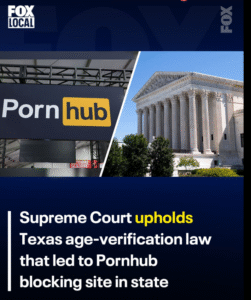The U.S. Supreme Court has upheld a Texas law that requires pornography websites to implement strict age verification measures for users accessing adult content. The decision marks a significant win for child protection advocates and signals a shift toward tighter regulation of online content at the state level.
The Texas law, known as House Bill 1181, mandates that adult websites must use “reasonable age verification methods” to ensure users are 18 or older before granting access to explicit material. Acceptable methods include scanning government-issued IDs or using third-party verification services. The law also allows Texas residents to sue websites that fail to comply, with the potential for significant financial penalties.
Supporters of the law argue that it is necessary to prevent minors from easily accessing harmful sexual content online. State officials cited growing concerns over the mental health impact of pornography on young people, as well as increased reports of underage exposure to explicit material. Governor Greg Abbott and other Texas lawmakers stated that the law is aimed at protecting children, not restricting adult access.
Opponents, including adult entertainment companies and digital rights organizations, challenged the law on First Amendment grounds. They argued that requiring users to submit personal identification to access legal adult content is an unconstitutional restriction on free speech and privacy. Major pornographic sites had threatened to block access to users in Texas altogether if the law went into effect.
Lower courts had issued mixed rulings, with some temporarily blocking the law, while others allowed it to move forward. The Supreme Court’s decision to uphold the law affirms Texas’ right to regulate content access for the sake of protecting minors, even in the realm of constitutionally protected speech.
Justice Samuel Alito, writing for the majority, emphasized the government’s compelling interest in shielding children from potentially harmful material. The Court concluded that the law does not amount to a blanket ban on adult content, but rather a targeted safeguard requiring platforms to take reasonable steps to verify age.
Civil liberties groups expressed disappointment with the ruling, warning it could set a precedent for further online censorship. They argue that requiring users to provide ID could deter law-abiding adults from accessing legal content and raise serious concerns about data privacy, especially if verification systems are breached or misused.
Texas is not alone in pushing for age verification laws. Similar legislation has been introduced or enacted in states like Louisiana, Arkansas, and Utah, sparking a broader national conversation about the role of government in regulating the internet. With the Supreme Court now affirming the legality of such measures, other states may be encouraged to pass their own versions.
As the law takes effect, adult websites serving Texas users must now ensure compliance or face legal consequences. The decision marks a new chapter in the debate over digital rights, parental control, and the responsibilities of platforms that host explicit content in the modern internet era.


